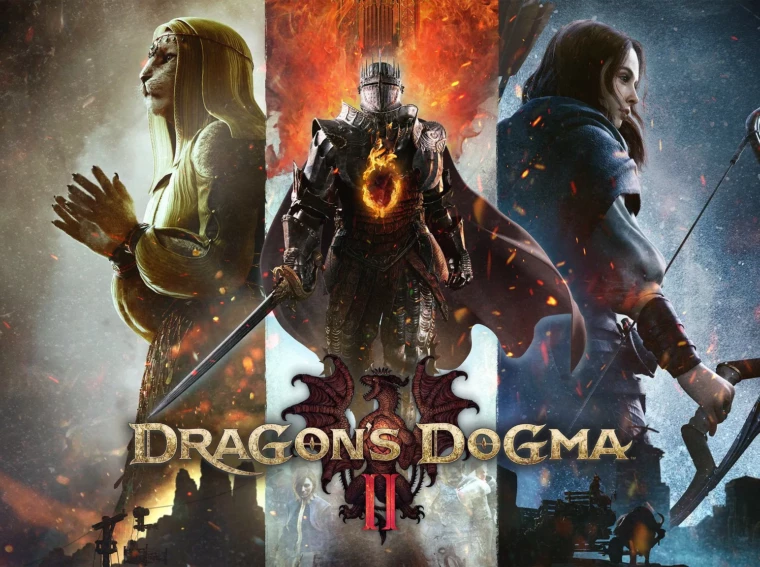My journey through Dragon’s Dogma 2 has been quite the rollercoaster: exhilarating, amusingly absurd, occasionally exasperating, and utterly captivating. It’s easily one of my favorite RPGs, yet simultaneously a major headache. Regardless of your ultimate take on it, this game is bound to be a topic of conversation for years to come.
While Dragon’s Dogma 2 doesn’t stray far from its predecessor and at times channels the essence of Monster Hunter and Elden Ring, it remains a unique experience filled with unforgettable moments: monumental battles against colossal behemoths, comical encounters with goblins begging to be tossed around, and the enduring charm of your NPC companions. Every few minutes, a new story unfolds.
You assume the role of the Arisen, a soldier slain by a dragon and resurrected without a heart. Each appearance of the dragon heralds a new Arisen, fated to confront this ancient beast. However, this time, another contender claims the title of Arisen, setting off a political conspiracy that intertwines with countless battles against massive monsters.
Despite the barrage of flat characters and stiff dialogue—everyone speaks with faux medieval grandeur and solemnity—the story weaves a complex tapestry that extends far beyond mere monster slaying. While many plot twists are predictable, the narrative remains engaging, reminiscent of a FromSoftware title but with a more accessible and explicit storytelling approach.
That said, I couldn’t care less about the scripted NPCs. The romantic and friendship systems, where you can go on dates and exchange gifts, feel disappointingly underdeveloped. However, the pawns are a different story. I’d go to great lengths for them, especially my main companion, Gorbo the goblin.
Pawns are your loyal and talkative allies, putting their lives on the line daily. Your main pawn, leveling up alongside you, remains by your side while you recruit two others made by other players or Capcom. These additional pawns don’t level up under your employ, requiring you to recruit new ones frequently, resulting in a constantly changing roster of oddball companions.
You can customize your main pawn using the same character creator you used for your Arisen, offering a wealth of options. Every detail, from individual teeth to tattoos, can be adjusted. By tweaking nearly every body part, you can create anything from an Adonis to an abomination. Officially, you can only create humans and beastren (large feline creatures), but players have unofficially crafted elves, orcs, goblins, and other unique creations.
I couldn’t have navigated the game without these invaluable companions.
Pawns are indispensable in combat, compensating for your weaknesses. They prove highly effective, with the occasional mishap—like a Fighter meant to throw me onto an ogre’s back inadvertently launching me off a mountain. Pawns also share their knowledge, marking caves and treasure chests on your map based on their previous adventures. Recruiting a pawn experienced in ogre encounters revealed their obsession with targeting women first—a quirky detail adding depth to the game world.
While pawns operate independently, you retain control, commanding them to guide you, aid you in battle, or wait in specific locations to avoid trouble. They can also serve as quest guides, vital given the quest descriptions’ vagueness. Dragon’s Dogma 2 expects you to solve problems independently, and these helpful companions make it possible.
Your main pawn can learn new skills when recruited by other players, making it worthwhile to make them appealing. I don’t mean physically attractive—though that’s a common strategy—I’m referring to equipping them with valuable specializations like foraging, crafting, trading, or healing, ensuring they receive plenty of hiring opportunities.
Through pawns, you can interact with other players, exchanging gifts and requests via the pawn quest system. I frequently request golden trove beetles to increase my carrying capacity, rewarding contributors with gold from my own stash.
Listening to pawns chat or share gossip about their previous masters adds to the immersive RPG experience. Each journey feels richer with their companionship and quirks, a comforting element during the game’s numerous extended trips.
Dragon’s Dogma 2 boasts vast landscapes, with two main regions—one lush and green, the other scorching and arid, punctuated by oases—plus a smaller volcanic island. The game’s grandeur is amplified by limited fast-travel options. Few locations offer fixed fast-travel points, and you can only use them with ferrystones, discouraging frequent use. Settlements with ox carts provide paid transportation, though the journey may be interrupted by monster attacks, forcing you to defend the cart.
The camping system significantly enhances travel, allowing you to rest and cook meals at campsites for various bonuses. However, campsites require tents, vulnerable to enemy raids. Despite these conveniences, the game retains a deliberate pace, encouraging exploration and immersion.
Dragon’s Dogma 2 thrives on thousands of random adventures, often in uncharted locations. While quests exist, exploration is driven more by curiosity than obligation. For instance, I spent an evening wandering a mist-shrouded village, dodging ghosts, followed by a cave excursion where I encountered a mythical creature challenging me to riddles—a memorable escapade driven by personal intrigue.
Exploration also presents engaging environmental puzzles, requiring creative solutions to reach hidden chests or dungeon entrances. Mages and Sorcerers can levitate, aiding traversal. The game’s quests often lack explicit instructions, necessitating independent problem-solving and enhancing the sense of discovery.
Despite occasional frustrations with vague quests and technical issues, Dragon’s Dogma 2’s captivating combat and immersive world keep drawing me back. The tactile combat system encourages experimentation, with each encounter a dynamic interplay of strategy and environment. Despite its flaws, I’m enamored with this ambitious RPG, eager to explore its depths further.

